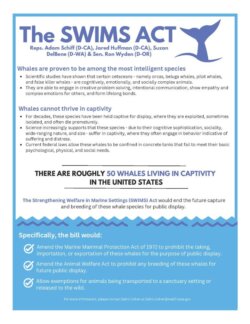The Strengthening Welfare in Marine Settings (SWIMS) Act would end the future capture and breeding of whales for public display.
In a significant move toward marine conservation and animal welfare, the SWIMS Act has been reintroduced to the United States Congress by Representatives Adam Schiff, Ron Wyden, Jared Huffman and Suzan DelBene. This legislation aims to put an end to the future capture and breeding of whales for public display.
Over the last 15 years, public opinion has changed considerably regarding keeping whales in concrete tanks for the purposes of entertainment. The reintroduction of the SWIMS Act reflects this evolution and is a critical step forward in addressing these concerns.

Re. Adam Schiff (D. Calif)
In the news release from Rep. Schiff’s office, the lawmakers say that the legislation reflects a shared commitment to animal welfare and marine conservation.
“Whales should be living free in the ocean, not the confines of a concrete tank,” Rep. Schiff notes. “The SWIMS Act would protect these magnificent creatures from lives trapped in captivity and prevent the cruel practice of breeding whales for public display.”
And Rep Huffman adds: “The science and tragic real-life experiences have shown us time and again that marine mammals suffer from being in captivity – often being exploited and abused. But our laws and practices don’t reflect that. We must finally make the humane changes that have been needed for decades.”
The legislation emphasizes the need for a more humane approach to the treatment of captive whales, highlighting the detrimental impact on their physical and psychological well-being.
“Whales should be living free in the ocean, not the confines of a concrete tank.” Rep. Adam SchiffThe SWIMS Act also specifically allows exemptions for animals being transported to a sanctuary setting or released to the wild, requiring that Section 102 of 26 the Marine Mammal Protection Act of 1972 be amended to make it “unlawful to export any orca, beluga whale, false killer whale, or pilot whale except for the transport of such species to a marine mammal sanctuary with a determination by the Secretary that the transportation to such sanctuary is in the best interest of the individual marine mammal; or for release to the wild.”
 And it adds that “the term ‘sanctuary’ means a place of refuge where marine mammals live in a captive setting as close as possible to their natural environment; are prioritized individually with respect to well-being and autonomy; and are not used for profit or breeding for the purpose of public display.’’
And it adds that “the term ‘sanctuary’ means a place of refuge where marine mammals live in a captive setting as close as possible to their natural environment; are prioritized individually with respect to well-being and autonomy; and are not used for profit or breeding for the purpose of public display.’’
The Animal Welfare Institute (AWI), which has played an important role in advocating for the SWIMS Act, notes that the SWIMS Act represents a crucial step toward ending the public display of captive whales and acknowledging the inherent cruelty and ethical concerns associated with keeping these intelligent beings in confinement.
“Science increasingly supports the conclusion that we cannot provide conditions in a concrete enclosure to accommodate the size, wide-ranging nature, and physiological and social needs of these four species,” says Dr. Naomi Rose, AWI’s marine mammal scientist and a member of the board of the Whale Sanctuary Project. “The SWIMS Act would compel marine theme parks and aquariums to focus on educational and conservation opportunities that do not perpetuate the unnecessary suffering of these animals.”
The reintroduction of the SWIMS Act represents a collaborative approach toward a more compassionate and sustainable future for these highly intelligent and emotionally sensitive animals.
swims_act 2024-0130